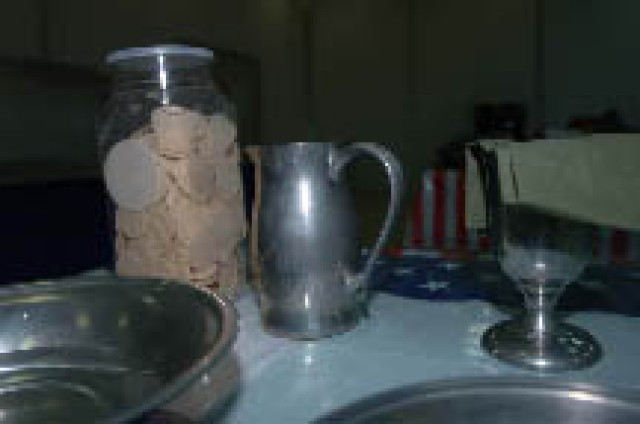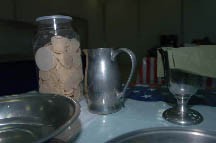
Batman had Robin, the Lone Ranger had Tonto, Sherlock Holmes had Watson and Don Quixote had Sancho Panza. While these sidekicks may not share the fame of their mentors, they all helped their leaders accomplish their missions and earn their praise, while gaining their own popularity as well.
This year, the Army and the Army chaplain corps are celebrating their own sidekicks, the chaplain assistants, who are celebrating a century of service.
Like famous sidekicks in literature, chaplain assistants become heroes themselves as they serves alongside heroic Army chaplains. But unlike many superhero sidekicks who only play a supporting role, the chaplain assistant is more than just a second stringer.
They provide a service that, if removed, would cripple the Army's ability to minister to its Soldiers.
"A bird with two wings can fly, but one with one can't," said Sgt. 1st Class Victor Ortiz, senior chaplain's assistant NCO at Fort McPherson. "We're the other wing."
The two-wing analogy makes even more sense when considering that the smallest Army "unit" is a chaplain detachment team, which consists of a chaplain and a chaplain assistant, said Staff Sgt. Erick Rodriguez, chaplain assistant NCO.
Though small in number, these units and other versions of unit ministry teams (UMTs), accomplish much due to the efforts of the chaplain assistant.
"The chaplain's far less productive and adept at caring for Soldiers without their chaplain assistant," said Chap. (Capt.) Brad Godding, chaplain resource manager for the Fort McPherson chapel. "They fill so many different roles they fill."
These roles include coordinating UMT activities, facilitating opportunities for worship, maintaining articles of worship, including the chapel, and safeguarding offerings.
Although not an official duty in their job description, chaplain assistants also bridge the gap at times between officers and enlisted personnel, Godding said, a gap created by protocol and sometimes intimidation of the officer rank held by chaplains.
Chaplain assistants also provide security in hostile environment for chaplains, Ortiz said, since chaplains are considered non-combatants and do not bear arms.
With so many roles to fill, Ortiz said every day is a learning experience, even after serving for 24 years as a chaplain assistant. During that nearly quarter-century of experience, Ortiz's classrooms include Panama after Operation Just Cause, Haiti during Operation Hold Democracy, Somalia and Korea.
In traveling to so many places, Ortiz said he was exposed to many different religious practices, all of which he had to familiarize himself with due to his job.
"One of requirement (of a chaplain assistant) is to provide all religious support for all religious faiths the Army recognizes," Ortiz said. "You need to be knowledgeable to be able to support and conduct these services."
Chaplain assistants train themselves to keep an open mind and to maintain a willingness to avoid bringing their personal belief systems into the job of facilitating another's religious beliefs.
"A lot of what is stressed is none of your opinions matter," said Pfc. Nicole Pena, chaplain assistant who works in the funds department at Fort McPherson. "You can't put your likes and dislikes into your work."
"You don't have to participate, just support," said Sgt. Shambra Pearsall, chaplain assistant NCO in the funds department, of how chaplain assistants avoid conflicts between supporting a faith different from their own belief system.
Because chaplain assistants interact with Soldiers of all faiths and denominations, there is no prerequisite faith that a chaplain assistant must ascribe to, Godding said. All someone needs to be a chaplain assistant is a great commitment to the professional Army ethics and high moral and ethical standards, he said.
For example, Ortiz said chaplain assistants are not supposed to say curse words
That is not to say that one's faith can't drive one to be a chaplain assistant. Pearsall began her life in the Army as a supply clerk. However, after a turn in her own life spiritually, she switched her military occupation specialty to a chaplain assistant, stating her own desire to help and support Soldiers.
It is a desire to help people that seems to have driven all the chaplain assistants on Fort McPherson to pursue this often difficult, yet highly rewarding job.
Ortiz said it was his desire to help people that persuaded him to enlist as a chaplain assistant and the fulfillment of that need of the heart that makes him continue to serve.
"One time Fort Bragg had a whole bunch of toys. I got commanders to share the names of needy Soldiers. We made Christmas for a lot of kids. I'll never forget that," he said, adding other memorable experiences include helping to clean up an and supporting other cleaners on an oil spill site in Korea.
Pearsell also shares memorable experiences in Korea, where she helped numerous Soldiers in the barracks deal with their issues.
"They'd just come knock on the door, anytime in the night, and you'd stay up helping them," she said.
That is not to say that duties are only found outside the borders of the United States. In fact, Ortiz said the playing field only gets larger in a garrison type environment.
"The different between war and here is in who you provide religious support to," he said. "In war, it is for the Soldiers. In garrison, you support activities not just for the Soldiers, but for civilian employees, family members and retirees. It's a bigger field to cover, but it is less dangerous."
It also is a little less stressful because one had more opportunities to rejuvenate oneself, said Rodriguez.
However, in war, despite the dangers and the risk of burning out, one can see how vital a chaplain assistant can be. Rodriguez, who has four tours to the Middle East under his belt, said it was during his deployments that he saw this first hand.
During his time in Kuwait, Saudi Arabia and Iraq, he had to go outside the base perimeter many times to travel to other camps to check up on people and provide ministry.
On one such trip, he met a chaplain assistant who saved his chaplain after the chaplain's vehicle was hit with an improvised explosive device, pulling him from the vehicle and rendering aid.
"I saw that we can provide more than religious assistance," Rodriguez said. "We support whatever mission there is. I've seen chaplain assistants on patrol, on quick reaction forces. To be a chaplain assistant you have to be very ingenious, be all things for all people."
In this sense, it seems only fitting that the same year the chaplain assistant is being celebrated, the Army is also celebrating the Year of the NCO.
"The same qualities that make a good chaplain assistant are the same qualities that make a good NCO," Godding said. "You have to care for Soldiers."

Social Sharing